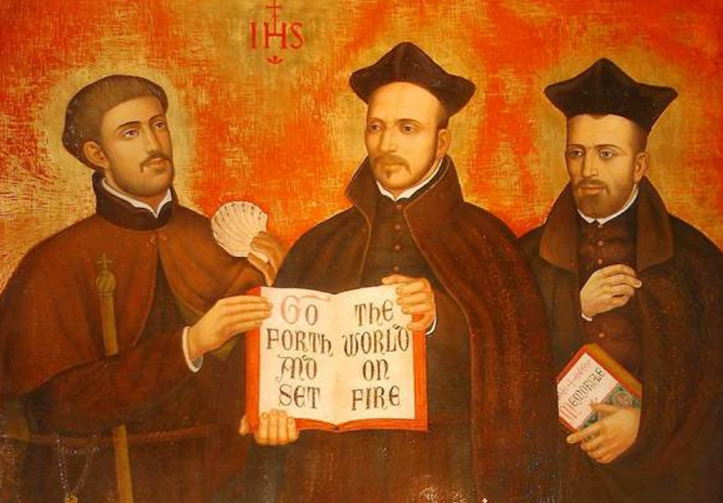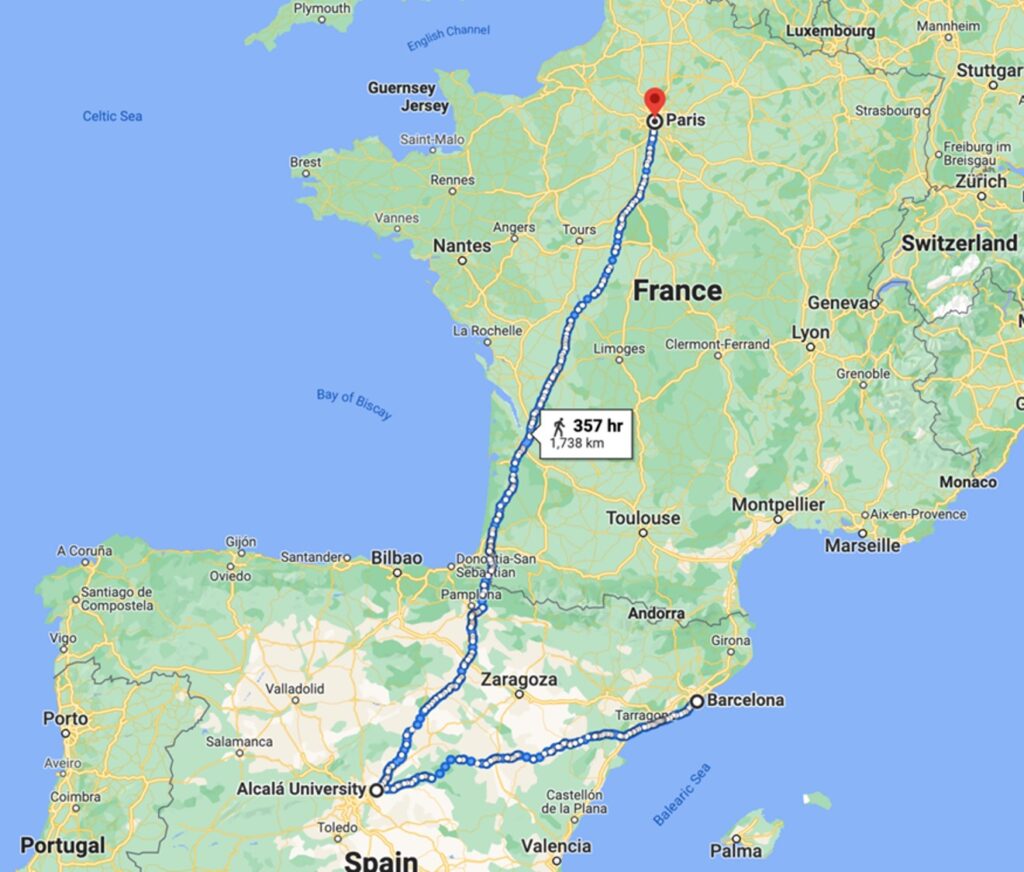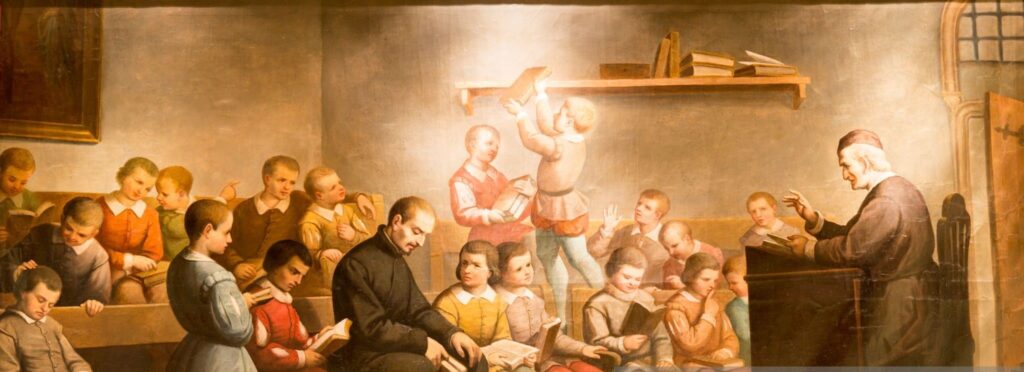
Chap. 7 Paris
Ignatius traveled to Paris by himself, walking the whole way despite his limp. It was the middle of winter and very cold, but Ignatius was determined to complete his journey, no matter what. No soldiers arrested him this time, and the reports he heard about French soldiers barbecuing Spaniards turned out to be a myth. In fact many were living in Paris, and Ignatius found a group of them who let him live with them for a while. He wrote to his friends back in Spain to let them know he was okay, and he made sure to thank Inés Pascual for all the support she had given him. Her generosity, along with the help of other friends from Barcelona, enabled him to begin his schooling in Paris, supplying him with enough money for two years. He became good friends with one of the Spaniards in Paris and entrusted his money to him so that he didn’t have to worry about it while he was taking classes.

Unfortunately this man turned out to be irresponsible, and he quickly squandered all of Ignatius’s money. So Ignatius had to beg to support himself again, and this was hard to do while keeping up with his schoolwork. He also lived far away from school, staying in a shelter for poor people that was a two-mile walk from campus. Since the first class of the day was at 4:00am, he had to get up extremely early just to make it to school on time. All the walking and begging and studying was too much for him, so he tried to find a part-time job, but there were none available. Then a friend recommended he go to Belgium every now and then since Spanish merchants lived there who might support him. His travels to Belgium were very successful, and he even went all the way to England on one trip, finding enough donations to cover his expenses for a long time. This was a great relief for Ignatius, but he never got angry with the Spaniard who lost all his money in the first place. In fact Ignatius helped him out later in life when the man fell ill and needed assistance. Ignatius walked more than ninety miles in three days just to visit him and help him get on a ship so the man could return home to Spain.
Ignatius could now focus on his studies, and he needed to concentrate now more than before since the University of Paris was very challenging. He realized he tried to tackle too much in his time at the Universities of Alcalá and Salamanca, and he needed to retake some classes, including Latin. He enrolled in the lowest-level course at Paris before going onto the more advanced ones, and this meant taking classes with the youngest students at the school. Most of his classmates in the introductory Latin course were teenagers, and some were as young as ten years old. Ignatius was thirty-seven at this point, and it must have been humiliating for him to take classes designed for kids, but he didn’t let this bother him. He was determined to do whatever it took to graduate from Paris.

When he wasn’t busy studying, Ignatius looked for opportunities to have spiritual conversations with people, which was his favorite thing to do. His simple lifestyle, spiritual wisdom, and charismatic personality made him popular at the university, and some people asked if they could do his Spiritual Exercises. He was happy to offer them to anyone interested, and since the University of Paris was a prestigious institution, many of these people were from famous families. The effect the Exercises had on them was tremendous, and as word spread about what Ignatius was doing, people started getting nervous. Several people who did the Exercises got rid of all their possessions and chose to live a simple lifestyle from now on, begging for their food and leaving the university houses to live with the poor. This upset a lot of people, especially those who believed their sons would become famous and accomplish amazing things someday. The families sent armed men to search for their sons, bring them back to school, and force them to continue their old way of life of comfort and wealth. After they graduated they could give everything to the poor and so forth, but not yet. Ignatius didn’t argue with the armed men, but he got upset when he heard the Inquisition was getting ready to interrogate him again. One official even threatened to have Ignatius dragged outside and whipped in public. So Ignatius immediately went to them and insisted they conduct a hearing where he could defend himself, but they backed down since there was no evidence of wrongdoing by Ignatius.
The personal growth that people received from the Exercises gave Ignatius great joy, and he started attracting a group of followers again. Ignatius wasn’t looking to start a group yet, especially since it didn’t work earlier in Spain. But it happened in Paris anyway. The first two were roommates of his: Pierre Favre and Francis Xavier. They had studied together in Paris for several years and had become good friends. Favre was the brightest of the three, and he did very well in school. Ignatius was one of the oldest students at the university, and school never came easy for him, so Favre helped him out with his studies. Ignatius was nearly 40 years old at this point, and he appreciated the tutoring from the younger Favre.
Francis Xavier was also young but less interested in the spiritual ideas of Ignatius, at least at first. He used to make fun of Ignatius for talking about God so much. Xavier was from a very powerful family in northeastern Spain, not far from where Ignatius grew up. In fact the Xavier family fought against the Loyola family at Pamplona when Ignatius was injured by a cannonball. Neither he nor Ignatius held a grudge about the family feud, and they soon discovered they had much in common. Both were Spaniards, both came from wealth and nobility, both were the youngest sons in their family, both lost fathers when they were young, and both had grandfathers who suffered disgrace and had to downgrade their castles as punishment. Xavier was athletic, successful, and popular, much like Ignatius had been in his youth. He was also stubborn and determined to pursue an ambitious career that would impress people – much like Ignatius again.
Both Favre and Xavier admired Ignatius and enjoyed spending time with him, but it wasn’t until he led them in the Spiritual Exercises that their friendship began to grow. He opened up their eyes to a new way of seeing the world and a new way of praying, encouraging them to use their imagination and to tap into their deepest desires. He also helped them with their personal struggles and enabled them to grow in virtue and live lives dedicated to serving others. Ignatius had watched people make this type of conversion before, and many people in the past wanted to follow him after completing the Exercises. But Calisto and his other companions from Salamanca never joined him in Paris, and it was unclear if these two would stay with Ignatius or fade away like the others.
Ignatius continued his work with the poor, and he reached out to victims of the bubonic plague since they were the most in need. While speaking to one victim Ignatius put his hand on the man’s sore, which made the man feel much better. But later that evening Ignatius’s hand began to hurt, and he started worrying that maybe he contracted the plague after touching the man. Then he began to worry more, and his hand hurt more, and Ignatius worried even more, and soon he was driving himself crazy. So he inserted his hand in his mouth, and said to himself, “If you’ve got the plague in your hand, you can have it in your mouth too!” It was a reckless thing to do, but it was Ignatius’s way of trying to calm himself down since he was getting so anxious about it. It also meant Ignatius had to quarantine at home and not go to school for a while, just to be safe, but thankfully Ignatius never contracted the plague.
The three friends grew very close over their four years together, and Ignatius started drawing other companions to him. His fame was growing in France, and people came from as far away as Spain just to be with him and learn from his spiritual wisdom. People always talked about a special charisma that Ignatius had which drew people to him, but there was something else too. Ignatius was never flashy or exciting, and he didn’t use eloquent words that impressed people. He was just genuinely interested in each person who came to him, and he would have one-on-one conversations with them so he could get to know them personally and help them discover how a deep relationship with God could enrich their lives.
By 1534 Ignatius had six close friends. Pierre Favre and Francis Xavier remained with Ignatius the whole time he was in Paris, and now they were joined by two friends from Spain: Diego Laínez and Alfonso Salmerón. Shortly after that came Nicolás Alonso (nicknamed “Bobadilla” after his hometown), and the final one was a Portuguese man named Simon Rodrigues. All were students at the University of Paris, but all decided they wanted to do something special together as a group. Under Ignatius’s guidance, all seven made the Spiritual Exercises together. This was a profound experience for them and united them more closely in their love for God. Each of them had heard Ignatius talk about his trip to Jerusalem and how he wanted to go back their someday, and each felt the same desire to go there and “help souls” by preaching to people about God. As they shared this idea with one another, they realized they were all called to this same mission and wanted to make plans to go to Jerusalem when they got the chance. For the time being they decided to gather at a church outside Paris in Montmartre, celebrate mass together, and make a vow to love other people, live a poor lifestyle, and make a pilgrimage to Jerusalem. If this last part was not possible, they would go to the pope and offer to do whatever he told them to. But they all decided to do this after graduation. First they had to finish their studies in Paris.
Each year the men renewed their vows, and each year the group grew a little bigger. By 1537 there were ten total. They came from various countries and backgrounds but were all united in their love of God and desire to do something great for Him. As graduation neared they made plans to travel to Venice and find a ship that would take them to Jerusalem. They were excited to embark on this new journey together, especially Ignatius who had long dreamed of spending the rest of his life in the Holy Land. But Ignatius encountered several obstacles before they could depart. One was the Inquisition, who wanted to investigate him yet again. He had already been imprisoned by them twice and put on trial multiple times, and he had enough. He took matters into his own hands by visiting them in person and demanding they give him a verdict. Apparently someone had falsely accused Ignatius of spreading heresy, and Ignatius wanted to have his reputation restored by a clean verdict. They insisted that he show them his book of the Spiritual Exercises, and he did so at once. He even made a copy for them to keep, and they admitted that they liked his Exercises and agreed to drop the charges against him.
The other problem for Ignatius was his health. He had been sick before, but now his stomach was in immense pain, and he wasn’t getting any better. Later it would be discovered that Ignatius had gallstones in his system, which are excruciatingly painful. Today you can get a procedure to remove them, but back then you had to suffer in agony for long periods of time since there was no remedy. He was afflicted by these for most of his adult life, and they got worse as he got older. One of his spasms lasted sixteen hours, and it seemed he might not survive if his condition worsened. The doctors tried everything but couldn’t stop the pain, so people encouraged him to go home and breathe in his native air, which would hopefully make him feel better. He made preparations to go back to Spain for a while and then meet up with his nine friends in Venice so they could sail to Jerusalem together. They promised to wait for him there, but this was wishful thinking. It wasn’t clear if Ignatius could even make it to Italy, let alone Jerusalem. It also wasn’t clear how people would treat Ignatius once he returned home since he hadn’t been back for thirteen years.
Reflection questions:
- What are the closest friendships I’ve had in my life? How have I been affected by those friendships?
- Have I ever been part of a group or community that did something great? How were we able to come together to achieve it?
Click here for chapter 8
